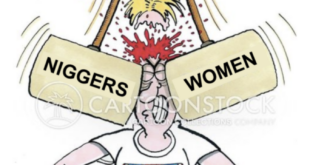Euro zone business activity contracted at the fastest pace since late 2020 in October as high inflation and fears of an intensifying energy crisis hit demand, according to a survey, suggesting the bloc is heading for a winter recession https://t.co/nlmXtWiGng pic.twitter.com/IRvliaLMaR
— Reuters (@Reuters) November 4, 2022
It’s funny how they slow-roll this stuff in the media.
The Daily Stormer is basically a spoiler alert website, where we tell you what the media is going to be saying a couple years before they say it.
The downturn in the euro zone economy has deepened as high inflation and fears of an intensifying energy crisis hit demand, adding to evidence the bloc is heading for a winter recession.
A closely-watched survey showed euro zone October business activity contracted at the fastest pace since late 2020. German industrial orders also slumped more than expected in September as foreign demand sank, putting Europe’s largest economy on course for recession.
S&P Global’s final composite Purchasing Managers’ Index (PMI) for the euro zone, seen as a good guide to economic health, fell to a 23-month low of 47.3 in October from September’s 48.1, albeit just above a preliminary 47.1 estimate.
Anything below 50 indicates contraction.
“The final euro zone PMIs for October paint a clear picture of falling activity and sky-high inflation,” said Jack Allen-Reynolds at Capital Economics.
“While it does not yet point to the 0.5% q/q contraction that we have pencilled in for Q4, the new orders and future output PMIs suggest that worse is to come.”
Asked what type of recession the euro zone would endure, 22 of 46 respondents in an October Reuters poll said it would be short and shallow while 15 said it would be long and shallow. Eight said it would be short and deep and only one said it would be long and deep.
In France, the bloc’s second biggest economy, earlier data showed industrial output declined in September although its PMI indicated services sector growth slowed less than initially forecast in October.
Spanish services sector activity contracted for the second straight month in October, weighed down by high inflation again, its PMI showed.
…
With no end in sight to the Russia-Ukraine conflict, nearly 65% of 34 respondents in the October Reuters poll said the cost of living in the euro zone would worsen or worsen significantly.
Since Russia’s invasion of Ukraine in February, energy costs have soared and with winter nearing several European governments have announced new measures to limit the increase in prices.
“The input and output price PMIs remain extremely strong. While they have fallen from their recent peaks, they are a very long way above their previous highs,” Allen-Reynolds said.
“The upshot is that Europe looks set for a painful winter of weak activity and strong inflation.”
No one is explaining how this won’t spiral totally out of control. There is no reason why that wouldn’t happen, and they are not saying why or how. They’re just saying “oh, it’s gonna be a little recession” now that there already is a massive downturn.
Deep Euro zone recession is coming. This is what's going on with manufacturing in the two biggest Euro zone economies: Germany (lhs) & France (rhs). Forward-looking orders – inventories (blue) are down to 2008 levels & headline indices (black) are following those down rapidly… pic.twitter.com/rnr6gTWLht
— Robin Brooks (@RobinBrooksIIF) November 3, 2022
 Daily Stormer The Most Censored Publication in History
Daily Stormer The Most Censored Publication in History


